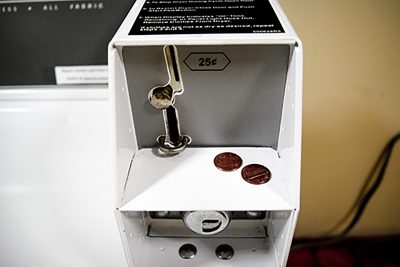The national coin shortage caused by the COVID-19 pandemic has created problems for banks, small businesses and, now, Boston University students using coin-operated laundry machines on campus.

This new dilemma adds another factor to the new normal that students are grappling with this semester.
Carolyn Evert, the vice president of Northeast Regional Communications at Chase Bank, wrote in an email that the shortage is due to government supply.
Chase Bank, which opened a new branch on BU’s campus last fall, released a notice about the coin shortage July 6, warning customers that they might not be able to process some large coin orders.
The Federal Reserve Bank released June 11 a statement regarding the restricted availability of coins.
“In the past few months, coin deposits from depository institutions to the Federal Reserve have declined significantly and the U.S. Mint’s production of coin also decreased due to measures put in place to protect its employees,” the statement read.
Colin Riley, a BU spokesperson, wrote in an email that students can choose to use convenience points via their Terrier Card in many locations. Laundry rooms in Bay State Road Brownstones, Commonwealth Avenue White Stones and East Campus apartments are not included, however.
Students in these residences have access to the laundry machines in buildings like The Towers and Kilachand Hall, where they can choose to use the Terrier ID card readers and pay with convenience points.
Riley wrote that BU is looking into alternative methods for laundry payment.
“Vending Services has begun adding the GPay system to laundry rooms as an alternative to coins,” Riley wrote, “where students can download the app and select their laundry machine.”
GPay, short for Greenwald Pay, is an app that allows users to check the availability of machines in a laundry room and add money from a credit card, according to the GPay website. It also alerts users when their laundry is complete, among other features.
Nancy Modehn, a customer service technician at Greenwald Industries, said customers can load funds directly from the mobile devices.
The program has been in use at several rental properties to test the service before it is expanded to all laundry rooms, Riley wrote.
“The results so far are positive,” Riley wrote.
Adam Jacknow, owner of Garment Valet, a laundry service located on Beacon Street, said the laundromat has remained relatively untouched by the coin shortage.
“It has not affected our retail laundromat operation, because we switched to a card system years ago,” Jacknow said. “We haven’t reopened our self-service because of the pandemic. There’s a concern of the social distance aspect.”
Grace Metcalf, a sophomore in the College of Arts and Sciences, said she had not known the Brownstone machines were coin-only.
She and her roommate went to Warren Towers and The Towers to exchange cash for coins, but the machines were out. Metcalf said they ultimately exchanged some at City Convenience.
“It’s definitely difficult,” Metcalf said. “It’s kind of a manhunt to find them.”
Amanda Slutzky, a sophomore in CAS, said she also encountered trouble finding quarters for laundry.
“I wish that I knew that it was coin-only before I got here because I feel like it would have been easier to bring coins with me,” Slutzky said. “I ended up going to the bank.”


















































































































